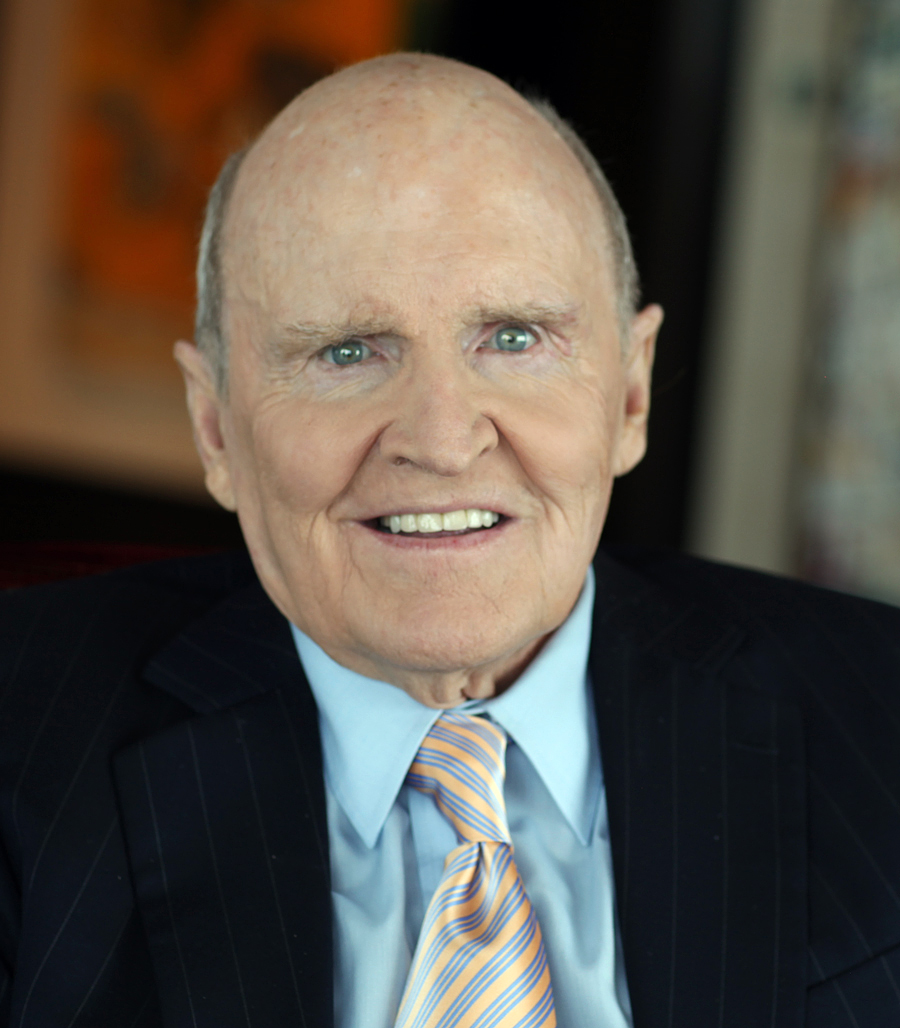
Jack Welch
John Francis Welch Jr. (November 19, 1935 – March 1, 2020) was an American business executive, chemical engineer, and writer. He was Chairman and CEO of General Electric (GE) between 1981 and 2001.
For other people named Jack Welch, see Jack Welch (disambiguation).
Jack Welch
March 1, 2020 (aged 84)
- Business executive
- chemical engineer
- writer
Chairman & CEO of General Electric (1981–2001)
4
When Welch retired from GE, he received a severance payment of $417 million, the largest such payment in business history up to that point.[1] In 2006, Welch's net worth was estimated at $720 million.[2]
Early life and education[edit]
Jack Welch was born in Peabody, Massachusetts, the only child of Grace (Andrews), a homemaker, and John Francis Welch Sr., a Boston & Maine Railroad conductor.[3] Welch was Irish American and Catholic. His paternal and maternal grandparents were both Irish.[4]
Throughout his early life in middle school and high school, Welch found work in the summers as a golf caddie, newspaper delivery boy, shoe salesman, and drill press operator.[4] Welch attended Salem High School, where he participated in baseball, football, and captained the hockey team and became second lieutenant right after graduating[4]
Late in his senior year, Welch was accepted to University of Massachusetts Amherst, where he studied chemical engineering. Welch worked in chemical engineering at Sunoco and PPG Industries during his college summers.[4] In his sophomore year, he became a member of the Phi Sigma Kappa fraternity.[4] Welch graduated in 1957 with a Bachelor of Science degree in chemical engineering, turning down offers from several companies in order to attend graduate school at the University of Illinois at Urbana-Champaign.[4][5] He graduated from the University of Illinois, in 1960, with a master's and a PhD in chemical engineering.[6][7]
Personal life[edit]
Welch had four children with his first wife, Carolyn. They divorced amicably in 1987 after 28 years of marriage.[54] His second wife, Jane Beasley, was a former mergers-and-acquisitions lawyer. She married Welch in April 1989, and they divorced in 2003. While Welch had crafted a prenuptial agreement, Beasley insisted on a ten-year time limit to its applicability, and thus she was able to leave the marriage reportedly with around $180 million.[55]
Welch's third wife, Suzy Wetlaufer (née Spring), co-authored his 2005 book Winning as Suzy Welch. She served briefly as the editor-in-chief of the Harvard Business Review. Welch's wife at the time, Jane Beasley, found out about an affair between Wetlaufer and Welch. Beasley informed the Review and Wetlaufer was forced to resign in early 2002 after admitting to the affair with Welch while preparing an interview with him for the magazine.[56] They married on April 24, 2004.[57]
Starting in January 2012, Welch and Suzy Welch wrote a biweekly column for Reuters and Fortune,[58][59] which they both left on October 9, 2012, after an article critical of Welch and his GE career was published by Fortune.[60]
Politics[edit]
Welch identified politically as a Republican.[66] He stated that global warming is "the attack on capitalism that socialism couldn't bring", and that it is a form of "mass neurosis".[67] Yet he said that every business must embrace green products and green ways of doing business, "whether you believe in global warming or not ... because the world wants these products".[68]
Regarding shareholder value, Welch said in a Financial Times interview on the global financial crisis of 2008–2009, "On the face of it, shareholder value is the dumbest idea in the world. Shareholder value is a result, not a strategy...your main constituencies are your employees, your customers and your products."[69]
Welch was widely criticized for his views on the job numbers from September 2012.[70][65]
After the Bureau of Labor Statistics released employment data stating that the U.S. unemployment rate had dropped from 8.1% to 7.8%, Welch tweeted, "Unbelievable jobs numbers ... these Chicago guys will do anything ... can't debate so change numbers".[71] Welch stood by his tweet, stating if he could write it again, he would add question marks at the end to make it clear that his intention was to raise a question over the legitimacy of the numbers.[72] A subsequent New York Post article on the employment data suggested manipulation of some of the survey responses by an individual employee in 2010,[73] but that article was widely debunked, including the fact that the employee had not worked at the Bureau since 2011.[74][75][76] No proof of the political manipulation of the job numbers from September 2012 has been presented.[77] The Census Bureau later released a statement denying the possibility of systematic manipulation of the data.[78] Still, in an opinion piece in The Wall Street Journal, Welch wrote that the debate led to people looking at unemployment data more carefully and skeptically. Referencing his original tweet, he stated "Thank God I did", in a Squawk Box appearance,[72] and also wrote, "The coming election is too important to be decided on a number. Especially when that number seems so wrong".[79]
Popular culture[edit]
On March 11, 2010, Welch cameoed as himself in the NBC sitcom 30 Rock, appearing in the season four episode "Future Husband". In the episode, Welch confronts Alec Baldwin's character, Jack Donaghy, to confirm the sale of NBC Universal to a fictional Philadelphia-based cable company called Kabletown. The sale is a satirical reference to the real-world acquisition of NBCUniversal from General Electric by Comcast in November 2009.[87]